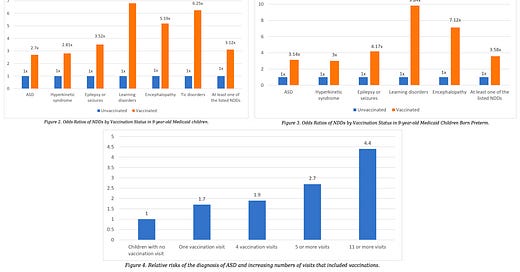BREAKING STUDY - Childhood Vaccination Associated with Autism, Learning Disorders, Seizures, Encephalopathy, and Tics
Vaccinated children 212% more likely to be diagnosed with at least one neurodevelopmental disorder (NDD) compared to unvaccinated children.
by Nicolas Hulscher, MPH
The study titled, Vaccination and Neurodevelopmental Disorders: A Study of Nine-Year-Old Children Enrolled in Medicaid, was just published after successful peer-review in the journal Science, Public Health Policy and the Law:
Background: Vaccinations required for school attendance have increased nearly threefold since the 1950s, now targeting 17 infectious diseases. However, the impact of the expanded schedule on children’s overall health remains uncertain. Preliminary studies comparing vaccinated and unvaccinated children have reported that the vaccinated are significantly more likely than the unvaccinated to be diagnosed with bacterial infections, allergies, and neurodevelopmental disorders (NDDs). The objective of this study was to determine the association between vaccination and NDDs in 9-year-old children enrolled in the Medicaid program. The specific aims were to test the hypothesis that: 1) vaccination is associated with autism spectrum disorder (ASD) and other NDDs; 2) preterm birth coupled with vaccination increases the odds of NDDs compared to preterm birth without vaccination; and 3) increasing numbers of vaccinations are associated with increased risks of ASD.
Methods: The study population comprised children born and continuously enrolled in the Florida State Medicaid program from birth to age 9. Vaccination uptake was measured by numbers of healthcare visits that included vaccination-related procedures and diagnoses. Cross-sectional analyses were performed to calculate prevalence odds ratios (Aims 1-2). A retrospective cohort design was used to compute relative risks specifically of ASD (Aim 3).
Results: The analysis of claims data for 47,155 nine-year-old children revealed that: 1) vaccination was associated with significantly increased odds for all measured NDDs; 2) among children born preterm and vaccinated, 39.9% were diagnosed with at least one NDD compared to 15.7% among those born preterm and unvaccinated (OR 3.58, 95% CI: 2.80, 4.57); and 3) the relative risk of ASD increased according to the number of visits that included vaccinations. Children with just one vaccination visit were 1.7 times more likely to have been diagnosed with ASD than the unvaccinated (95% CI: 1.21, 2.35) whereas those with 11 or more visits were 4.4 times more likely to have been diagnosed with ASD than those with no visit for vaccination (95% CI: 2.85, 6.84).Conclusions: These results suggest that the current vaccination schedule may be contributing to multiple forms of NDD; that vaccination coupled with preterm birth was strongly associated with increased odds of NDDs compared to preterm birth in the absence of vaccination; and increasing numbers of visits that included vaccinations were associated with increased risks of ASD.
Now, let’s break this study down into more simple terms:
Vaccination and Neurodevelopmental Disorders (NDDs):
Odds Ratio (OR): 3.12 (95% CI: 2.85-3.41)
What This Means: Overall, vaccinated children were 212% more likely to be diagnosed with at least one neurodevelopmental disorder (NDD) compared to unvaccinated children. This includes conditions such as autism spectrum disorder (ASD), ADHD, epilepsy/seizures, encephalopathy (brain dysfunction), tic disorders, and learning disorders.
Keep reading with a 7-day free trial
Subscribe to Courageous Discourse™ with Dr. Peter McCullough & John Leake to keep reading this post and get 7 days of free access to the full post archives.





